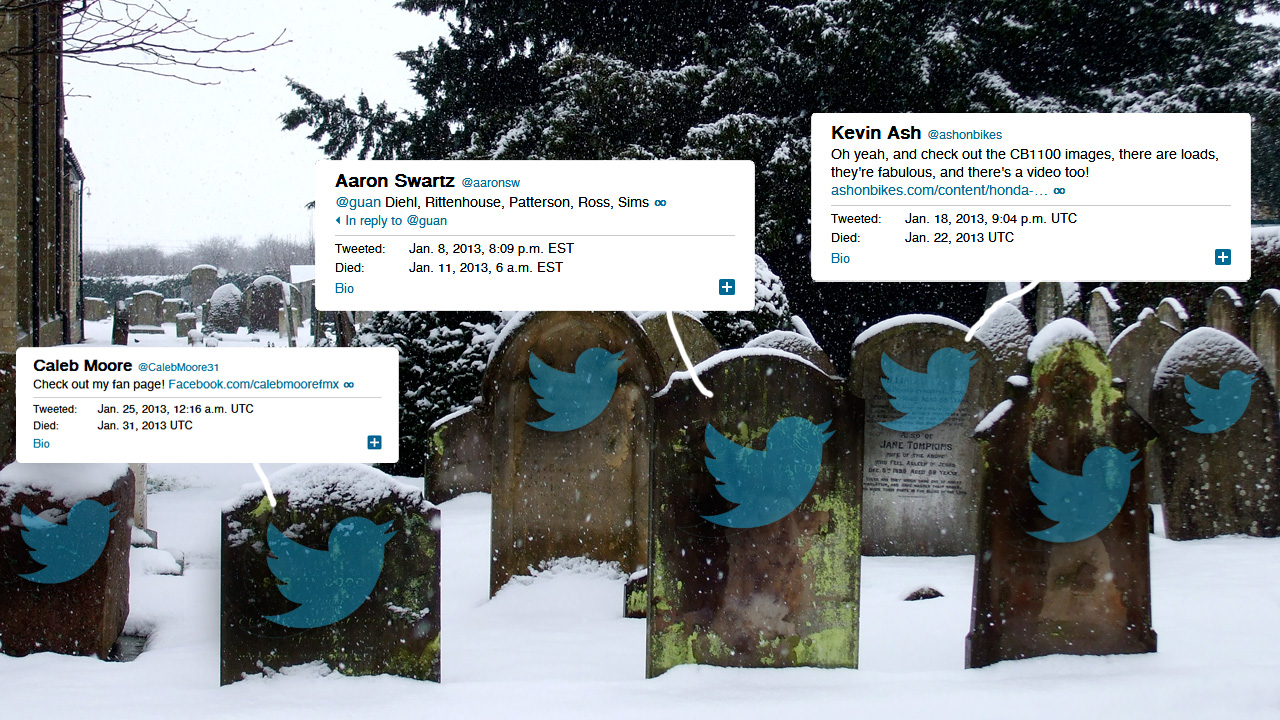With the number of people using Twitter today, it is inevitable that some of those users will die. It’s also inevitable that among the dead, there will be famous people. Jamie Forrest and Michael McWatters understood that and created The Tweet Hereafter, a catalog of last words via Twitter. Some collected final tweets are mundane, but others, like Aurora shooting victim Jessica Redfield’s, are unintentionally chilling.
The catalyst for Tweet Hereafter was conservative figure Andrew Breitbart’s death last year. Hours before he had a fatal heart attack, he sent a tweet; Forrest and McWatters had a conversation — on Twitter, of course — about how Breitbart was being remembered for his outbursts and opinions online. Through that discourse, they developed the idea that would eventually become Tweet Hereafter. After a few more weeks of conversation, they physically created the site; McWatters handled the design, and Forrest coded.

The site has been around for a year, but only its creators were aware of its existence until now. After athlete Oscar Pistorius was charged with murdering his girlfriend Reeva Steenkamp, Forrest and McWatters decided to take it public.
“Death is a touchy subject, and we certainly don’t want to upset people,” Forrest said. “Every once in a while Michael or I would email the other and say, should we start telling people about this? The answer kept being no until Reeva Steenkamp’s tweet, when the tragedy of the situation and the distressing irony of her final tweet made everything particularly poignant.”
There’s no one single message that Tweet Hereafter is trying to get across, because as Forrest says, “Death is a complicated thing.” McWatters thinks that people will glean their own observation from the site, as he has found his own.
“The message I take away from The Tweet Hereafter is that everything I do online (and sometimes offline, too) has the potential to be part of my permanent digital record,” McWatters said.
The current archival in technology on sites like Twitter or Facebook chronicles much more than the average Web history. It’s come to the point where, if given permission, sites will mark your location as you post a picture of that great sandwich you just ate. And that will be there until you choose to delete it. While Forrest sees this present form of technology as just a fact of life, McWatters says he still has control of how much he contributes to the internet abyss.
“Sometimes it feels obtrusive, but I remind myself that I can always opt out: I can stop posting and tweeting…and sometimes I do,” McWatters said. “I take a break. Lately I find myself thinking a lot longer and harder before I post something, even trivial updates. I consider how it may reflect on me, my family, my friends, and my colleagues.”
In terms of public reaction for Tweet Hereafter, no one’s been extremely offended so far.
“Most of the feedback has been along the lines of, ‘Wow this is morbid and somewhat disturbing, but fascinating,'” Forrest said. “We tend to agree.”


